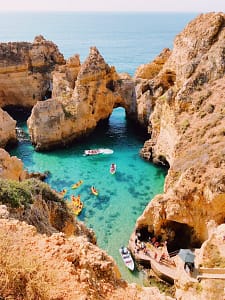Introduction
Portugal, located on the Iberian Peninsula, is a country where ancient traditions harmoniously coexist with modern advancements. Known for its stunning coastline, rich maritime history, and vibrant culture, Portugal has steadily emerged as one of Europe’s top destinations for living, investing, and traveling in 2025.
Geography and Climate
Portugal is bordered by Spain to the east and north and the Atlantic Ocean to the west and south. Its diverse geography includes the lush Douro Valley, the mountainous Serra da Estrela, and the golden beaches of the Algarve. Portugal enjoys a Mediterranean climate with mild, rainy winters and hot, dry summers, particularly in the southern regions.
Political System
Portugal is a semi-presidential representative democratic republic. The President serves as head of state, while the Prime Minister heads the government. Portugal is a member of the European Union, NATO, and the United Nations, maintaining a stable and peaceful political environment that encourages foreign investment and international cooperation.
Economic Overview
Portugal’s economy is diverse and growing steadily. Major industries include tourism, agriculture, automotive and aerospace manufacturing, technology, and renewable energy. Lisbon, the capital, has become a tech hub, hosting international events like the Web Summit. Despite economic challenges from past decades, Portugal has strengthened its labor market, public finances, and investment climate.
Culture and Society
Portuguese culture is a vibrant mix of tradition and modernity. The country is famous for Fado music, colorful festivals, historic architecture, and culinary delights like pastel de nata and bacalhau. Family, respect, and hospitality are deeply rooted values. Portugal also has a strong sporting culture, particularly in football, with legendary figures like Cristiano Ronaldo.
Education and Innovation
Education in Portugal is compulsory from ages 6 to 18. The country has made significant strides in improving literacy rates and access to higher education. Universities such as the University of Lisbon and the University of Coimbra are internationally recognized. In recent years, Portugal has invested heavily in innovation, especially in technology, green energy, and startups, making Lisbon and Porto attractive hubs for young entrepreneurs.
Tourism and Attractions
Portugal is one of the fastest-growing tourism destinations in Europe. Key attractions include:
- Lisbon: The vibrant capital city known for its historic neighborhoods, tram rides, and riverfront views.
- Porto: Famous for its wine cellars, medieval streets, and iconic Dom Luís I Bridge.
- Algarve: A stunning coastal region known for its beaches, golf resorts, and limestone cliffs.
- Madeira and Azores: Autonomous regions offering dramatic landscapes, hiking, and eco-tourism.
Living in Portugal
Portugal is ranked among the best countries for expatriates, offering affordable living costs compared to other Western European nations. Quality healthcare, friendly locals, safety, and a slower pace of life attract retirees, remote workers, and investors alike. The country’s Golden Visa program and D7 visa also make it easy for foreigners to relocate.
Challenges and Future Outlook
While Portugal offers many advantages, it faces challenges such as rising property prices in urban areas, regional inequalities, and ensuring sustainable tourism growth. Nonetheless, with its progressive policies and resilient spirit, Portugal is well-positioned for a prosperous future in the global landscape.
Conclusion
Portugal stands out as a country where history, culture, and innovation meet to create an exceptional quality of life. Its rich heritage, combined with modern dynamism and scenic beauty, ensures that Portugal continues to capture the hearts of travelers, investors, and residents worldwide.
Sources and Further Reading
- Visit Portugal – Official Tourism Portal
- Portuguese Government Official Website
- World Bank – Portugal Overview



